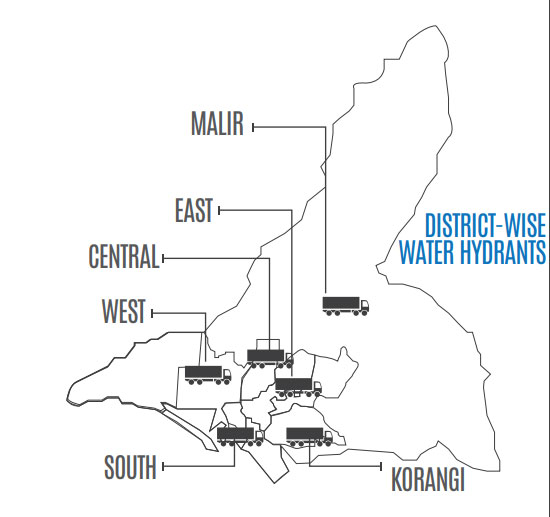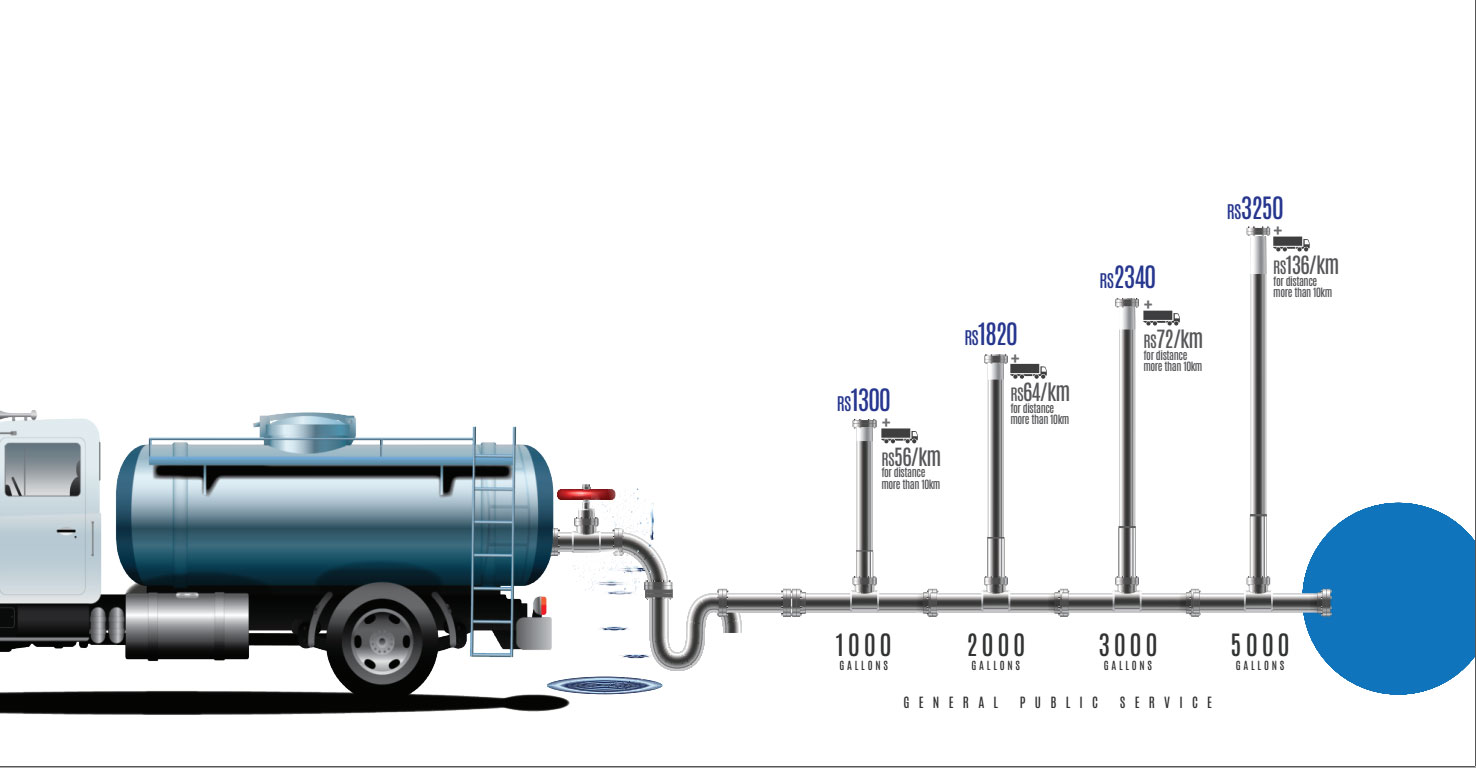An expensive solution to water shortage about to get dearer
The Karachi Water & Sewerage Board’s (KWSB) consumers complain that they do not get water in their lines but instead through water tankers, for which they pay hefty amounts.
The KWSB, on the other hand, complains about not having enough water to supply to the entire city, and about a degrading infrastructure, for which the board has come up with the solution of water hydrants, which has resulted in the tanker mafia looting the KWSB’s consumers.
To curb this mafia, a water commission mandated by the Supreme Court of Pakistan allowed the board to run a single hydrant in every district of the city. Six of the seven districts have a hydrant each, but the newly carved out District Keamari does not have one yet.
There are two more hydrants. A KWSB official explained to The News that a static hydrant is for the Pakistan Army and the National Logistics Cell, while the other hydrant was installed specifically for Baldia Town on the water commission’s orders, and it is run once a week.
“Forty per cent of Baldia Town does not have water lines,” said the official. That is why the water commissioner allowed the KWSB to continue the operation of the Baldia Town water hydrant, he added.
The board issues tenders for the hydrants’ operation every two years. According to the agreement of the winning companies with the KWSB, they are bound to grant 45 per cent of the water to the public and 55 per cent for commercial purposes.
Apart from this, the contractors are bound to give water from the hydrant free of charge for social causes such as religious processions, and for emergency purposes such as infernos.
A rate committee comprising KWSB engineers calculates general public service (GPS) and commercial service rates. According to the notification issued in July 2020, a 1,000 gallon water tanker for GPS costs Rs1,300, a 2,000 gallon one costs Rs1,820, a 3,000 gallon one costs Rs2,340 and a 5,000 gallon one costs Rs3,250.
The KWSB official explained that there are no additional charges if the distance between the hydrant and the consumer’s house is up to 10 kilometres, but beyond that consumers pay additional charges per kilometre. He pointed out that the rates will be revised due to the sharp increase in petrol prices.
For a 1,000 gallon water tanker supplying beyond 10km, an additional Rs56/km is charged, for a 2,000 gallon one, Rs64/km, for a 3,000 gallon one, Rs72/km, and for a 5,000 gallon one, Rs136/km.
A 1,000 gallon water tanker for commercial service costs Rs2,600, a 2,000 gallon one costs Rs3,250, a 3,000 gallon one costs Rs4,550 and a 5,000 gallon one costs Rs5,200.
According to the KWSB official, every hydrant given on contract is monitored through a formula based on two to three meters. The water board has a meter division that charges the contactors based on a certain formula.
A smartphone app, KWSB OTS (online tanker system), is being run by a company hired collectively by all the contractors of the water hydrants, said the official.
“The purpose of the app is to facilitate the public in getting water tankers,” he explained, saying that between midnight and 8am, the app registers approximately 400 applications for water tankers, depending on the supply that day.
Once the day’s quota is reached, the app closes. Consumers who do not get a tanker despite registering can file a complaint on the app or contact their help centre. The complaint is usually addressed within 24 hours, said the KWSB official.
-
 AI Innovation Could Make Trade Secrets More Valuable Than Patents, Says Billionaire Investor
AI Innovation Could Make Trade Secrets More Valuable Than Patents, Says Billionaire Investor -
 King Charles Heckling: Calls For 10 BAFTAs And A Knighthood For Sign Language Interpreter
King Charles Heckling: Calls For 10 BAFTAs And A Knighthood For Sign Language Interpreter -
 Kim Kardashian Leaves Meghan Markle 'upset' With Latest 'cheap Shot'
Kim Kardashian Leaves Meghan Markle 'upset' With Latest 'cheap Shot' -
 Royal Expert On Andrew, Sarah Ferguson’s ‘entitled’ Behaviour Since Marriage
Royal Expert On Andrew, Sarah Ferguson’s ‘entitled’ Behaviour Since Marriage -
 Instagram And YouTube Accused Of Engineering Addiction In Children’s Brains
Instagram And YouTube Accused Of Engineering Addiction In Children’s Brains -
 Trump Reached Out To Police Chief Investigating Epstein In 2006, Records Show
Trump Reached Out To Police Chief Investigating Epstein In 2006, Records Show -
 Keke Palmer Praises Actor Who Inspired 'The Burbs' Role
Keke Palmer Praises Actor Who Inspired 'The Burbs' Role -
 Humans May Have 33 Senses, Not 5: New Study Challenges Long-held Science
Humans May Have 33 Senses, Not 5: New Study Challenges Long-held Science -
 Kim Kardashian Prepared To Have Child With Lewis Hamilton: 'Baby Using A Surrogate'
Kim Kardashian Prepared To Have Child With Lewis Hamilton: 'Baby Using A Surrogate' -
 Internet Splits Over New York's Toilet Data Amid Bad Bunny's Super Bowl Show
Internet Splits Over New York's Toilet Data Amid Bad Bunny's Super Bowl Show -
 Prince William Inspects Saudi Arabia's Efforts To Promote Football In Young Girls
Prince William Inspects Saudi Arabia's Efforts To Promote Football In Young Girls -
 Northern Lights: Calm Conditions Persist Amid Low Space Weather Activity
Northern Lights: Calm Conditions Persist Amid Low Space Weather Activity -
 'Look What Andrew Has Done': Meghan Markle Defended On Jeremy Vine Show
'Look What Andrew Has Done': Meghan Markle Defended On Jeremy Vine Show -
 Apple, Google Agree To Make 'app Store' Changes Over UK Regulator Concerns
Apple, Google Agree To Make 'app Store' Changes Over UK Regulator Concerns -
 Autodesk Files Lawsuit Against Google Over AI Video Tool Trademark Dispute
Autodesk Files Lawsuit Against Google Over AI Video Tool Trademark Dispute -
 San Francisco 49ers Player Shot Near Post-Super Bowl Party
San Francisco 49ers Player Shot Near Post-Super Bowl Party





